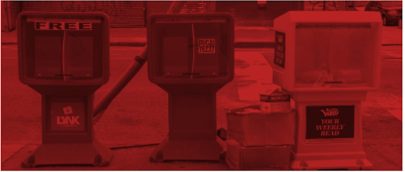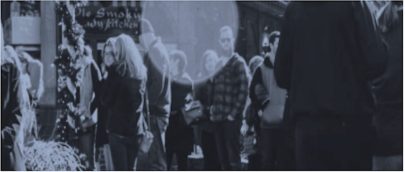STATE ACTIVITY TRACKER
In October 2025, California Gov. Gavin Newsom approved Assemblymember Buffy Wicks’ $20 million news funding partnership with Google. The bill passed on a strict party-line vote, with Democrats supporting it and Republicans opposed, and created the Civic Media Program, which would provide grants to local news organizations. GO-Biz Director Dee Dee Myers (or her successor) has not yet chosen how funds will be distributed, but the state on Feb. 3, 2026, gave notice of its intent to award The James B. McClatchy Foundation with responsibility for administering the grants. GO-Biz will also appoint a nine-person news industry advisory board.
The Civic Media Fund comes from a 2024 agreement with Google that led to the shelving of two key bills: Wicks’ AB 886, known as the California Journalism Preservation Act, which sought to secure funding for local news through tech platform agreements or arbitration, and Sen. Steven Glazer’s SB 1327, which aimed to levy a fee on digital ad revenues from major tech companies.
In June 2025, Governor Gavin Newsom signed a package of bills that includes $15 million in expanded funding for the landmark California Local News Fellowship Program hosted by UC Berkeley, which places journalists in newsrooms around the state. The new funding will support a two-year cohort of reporting fellows to continue the program through 2028. The program was created in 2022 by Sen. Glazer with a $25 million allocation to UC Berkeley’s journalism school to fund at least 40 fellows in local newsrooms across the state.
AB 611, introduced by Assemblymember Alex Lee (D–San Jose) in 2025, would have required a 120-day notice before the sale of a local newsroom to a hedge fund, private equity firm or publicly traded company. The bill, sponsored by California Common Cause and supported by Rebuild Local News, was inspired by Illinois’ landmark sale-notice law. After passing the Assembly 41–14, the bill has been held over in the Senate Judiciary committee until 2026.
As of July 2025, California state agencies are required to create plans to expand spending on ethnic and community media advertising after Gov. Newsom signed AB 1511, sponsored by Assemblymember Miguel Santiago (D-Los Angeles). The agencies are required to report on their progress in September 2026.
Rebuild Local News partnered with independent news organizations in Connecticut to once again advance the policy. Other local news bills introduced by Rep. Farrar in Connecticut in 2025 included HB5878, a refundable employment tax credit for news organizations. It would have established a refundable tax credit to news organizations that cover local communities in the state, in the amount of $15,000 per journalist employed in the state by such organization and $25,000 per new journalist hired in the state by such organization, with a cap on the amount a news organization is allowed of $150,000. The bill met strong Republican opposition in the Finance committee and did not advance.
Other bills introduced in the 2025 session included HB6418, which requires 120 days’ notice before the sale of a news organization to an out-of-state buyer. Under this bill, no owner of a news organization that primarily serves any community in the state may sell the organization to an entity not incorporated in the state without providing at least 120 days’ advance notice to the organization’s employees and community members; the bill passed the Labor committee, but did not get called for a floor vote. Another bill, HB6076, would have established and fund at least twelve fellowship positions in local newsrooms for recent graduates of journalism programs at public institutions of higher education. The bill passed out of the Higher Education Committee, but did not get called for a floor vote.
In 2025, Gov. JB Pritzker signed Sen. Steve Stadelman’s SB213, requiring state agencies to disclose how they spend their advertising budgets, which outlets receive those funds, and to post that information on their websites each year. The first annual report on government advertising spending is due in October 2026.
In 2025, Sen. Stadelman also reintroduced his Journalism Preservation Act, SB 1732, a “bargaining code” bill aimed at forcing Google and Meta to pay local newsrooms for their journalism, closely modeled on California’s similarly named legislation from 2023-2024. The bill did not advance.
The Strengthening Community Media law was enacted in 2024, requiring a 120-day notice to employees and the community before a local news organization can be sold to any company. The notice law has seen two tests so far. First, Better Newspapers, Inc., did not appear to give notice before selling several local titles to Paxton Media Group in 2025, raising questions about how the statute is to be enforced if not followed. More recently, Paddock Publications gave a 120-day notice on Jan. 6, 2026 of its intent to sell the Daily Herald, but did not disclose the name of the potential buyer.
The Strengthening Community Media law also created the groundwork for a scholarship program for journalists from Illinois colleges who pledge to work in state newsrooms. However, the program has not been funded, and Senator Stadelman is expected to continue efforts to do so in 2026.
The Chicago Independent Media Alliance (CIMA), which was key in securing the policy, is now led by Public Narrative, a Chicago-based nonprofit that offers resources to promote media literacy and amplify community voices. It will oversee the city advertising efforts, including publishing an annual report on how city ad dollars are distributed to eligible news outlets.
A refundable journalist employment tax credit, HB0891, similar to those enacted in New York and Illinois, was introduced by Delegates Vogel and Foley in 2025. Newsrooms could claim up to $25,000 per journalist covering local news in Maryland for the first year of the program and then $15,000 for each following year. The bill did not advance and was not reintroduced in 2026.
A local news bill introduced by Delegate Mary Lehman in 2025 would have created a 120-day waiting period before a local news outlet could sell to an out-of-state company. Under the proposed bill, HB 51, local news organizations would be required to notify employees, the Maryland Department of Labor, and the local county government. The bill failed to advance out of the House Committee on Economic Matters.
A tax credit for small businesses that advertise with local news was introduced in 2023 by six legislators, led by Del. Joe Vogel (D-Rockville). HB0540 would have provided a $1,000 tax credit to local businesses who advertise in qualifying local media and $500 in the subsequent years. The bill did not pass.
New Jersey lawmakers passed a law in June 2025, effective March 1, 2026, allowing state offices to post legal notices on their own websites or digital news sites — a shift away from print that could cut into a key revenue stream for local outlets. The financial impact is uncertain: a 2016 report estimated governments spent $7.3 million annually on legal notices in newspapers, with private parties adding $24.9 million.
The New Jersey Civic Information Consortium won back $2.5 million in funding in the state budget passed in July 2025 this week after Governor Phil Murphy eliminated it in his FY2026 budget plan released in February 2025. New Jersey launched the first-of-its-kind Civic Information Consortium in 2018 to provide grants to civic information producers in the state, including newsrooms. Since then it has given out over $12 million in grants.
New Mexico’s 2025-2026 state budget will direct $350,000 to the University of Mexico for an expanded fellowship and internship program and for the launch of a high school journalism support program, according to Rashad Mahmood, executive director at New Mexico Local News Fund, which has operated the state’s local news fellowship since 2019. Another $150,000 will be allocated to support community journalism programs based at community colleges.
In total, the fellowship has placed 18 New Mexico university graduates in local newsrooms. During the 2024 legislative session, the state committed another $200,000 to the program over the next two years. This comes after the legislature appropriated $125,000 during the 2023 legislative session, a measure that won bipartisan support from the Senate Tax, Business and Transportation committee. The funds have helped the New Mexico Fund for Local News add more fellows to the program.
A 2025 proposal from Rebuild Local News to include nonprofit news organizations in the Newspaper and Broadcast Media Jobs Program passed the State Senate but did not advance in the Assembly. Advocates are considering next steps for 2026.
In January 2025, New York Senator Monica Martinez (D-Brentwood) introduced the Lift Our Communities Advertise Local (LOCAL) bill, S1865, that would provide tax credits for small businesses – especially women-owned, minority-owned, and disabled veteran-owned businesses that advertise in local news. The bill did not advance but was held over and referred to the Senate Commerce, Economic Development and Small Business Committee on Jan. 7, 2026.
In February 2025, Senator Rachel May introduced S4401, a “bargaining code” bill creating an arbitration mechanism for news publishers to seek compensation from Big Tech, primarily Google. Notably, S4401 is not locally focused and lacks many of the journalist employment, labor spending and transparency requirements of its sibling bills in California, Illinois and Oregon. The bill did not advance in 2025 and was re-referred to the Senate Consumer Protection Committee on Jan. 7, 2026, where it has not been heard.
In December 2025, the Center for Community Media (CCM) and URL Media published an open letter to newly elected Mayor Zohran Mamdani calling for stronger enforcement of Local Law 83 and greater independence and transparency for the Mayor’s Office of Ethnic and Community Media (MOECM). Since then, Mamdani has issued two executive orders moving MOECM under the newly created Office of Mass Engagement.
As an alternative to passing Sen. Pham’s SB686 in 2025, Republicans in the Senate minority counter-proposed a publicly funded $50 per-person tax credit program to offset either the cost of Oregon local news subscriptions or donations to nonprofit journalism support or transparency organizations. Nonprofit newsrooms without subscription programs appeared to have been excluded. The Republican counter-proposal was based on Senator Cedric Hayden’s SB57 introduced earlier in the 2025 session. Neither concept was seriously considered.
A group of lawmakers in Oregon, led by Sen. Pham, proposed legislation in 2023 that would have included an allocation to the Agora Journalism Center at the University of Oregon along with the Fund for Oregon Rural Journalism (FORJ) to study Oregon’s information needs and public policies that would address them. The bill failed.
The Washington State Legislature enacted a decade-long policy in 2024 that waives the business and occupations tax for newspaper publishers. It would include eligible digital news outlets if they had a printed publication as recently as Jan. 1, 2008, but did not exempt digital-native publications.
Washington’s legislature approved $2.4 million over two years in 2023 to support 8 journalists a year, paid $55,000 each, through a fellowship program to be run by Washington State University. Half of the fellows were to be graduates of the University. The first six journalists began reporting in April 2024.
Meanwhile, a group of Democrats introduced a package of policies, including a fellowship program, a subscription tax credit and a local journalism grant program modeled after the New Jersey Civic Information Consortium, during the 2024 session. Free Press has endorsed the package and the Wisconsin Newspaper Association has endorsed the fellowship program component of the bill.




